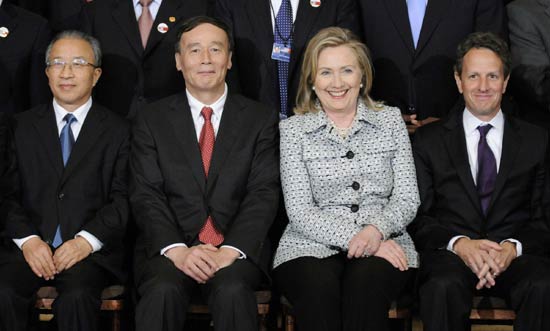News
Vice-premier's speech at Sino-US dialogue opening
(Xinhua)
Updated: 2011-05-10 11:04
 |
Large Medium Small |
WASHINGTON - The economic track opening session of the third round of China-US Strategic and Economic Dialogues (S&ED) kicked off here in Washington DC on Monday.
 |
|
(L-R) China's State Councilor Dai Bingguo, Vice-premier Wang Qishan, US Secretary of State Hillary Clinton and US Treasury Secretary Timothy Geithner gather for a portrait before a banquet for the Strategic and Economic Dialogue at the State Department in Washington, May 9, 2011. [Photo/Xinhua] |
The following is the full text of remarks by Chinese Vice-premier Wang Qishan at the session.
Remarks by Chinese Vice Premier Wang Qishan at the Opening Session of the Economic Dialogue of the Third Round of China-US Strategic and Economic Dialogues in Washington DC, May 9, 2011.
Secretary Timothy Geithner, Dear Colleagues,
It gives me great pleasure to co-chair the third round of the China-US Economic Dialogue together with Secretary Geithner.
This year is a year of historic importance for China-US relations. During his visit to the United States, President Hu Jintao made the decision with President Barack Obama to build a comprehensive and mutually beneficial economic partnership between our two countries. The central task of our dialogue this time is to follow through on the important agreement reached between the two presidents. I hope that, through in-depth discussions on the strategic issues in our economic relations, we will achieve more win-win outcomes.
The world economy is now slowly recovering, but the situation is still complicated and fraught with uncertainties. The European sovereign debt crisis, excess global liquidity, increased volatility in the commodities market, the turbulent situation in some Middle East and North African countries, and the tsunami and nuclear leak triggered by the devastating earthquake in Japan have all seriously affected market confidence. Both China and the US assume important positions in the world economy, but there is still a big gap between us in terms of both hard power and soft power. The key to global economic recovery lies with the United States. We are pleased to note that the US economy is gradually improving and the Chinese economy as a whole is in good shape. At the same time, both economies face quite a few new challenges and deep-seated problems. We should therefore share information on macroeconomic, fiscal, financial, economic, trade and investment issues and strengthen communication and coordination to promote sustained, steady and sound economic development in both countries and the whole world.
As the world's biggest developing country and biggest developed country, China and the United States enjoy strong economic complementarity and vast potential for cooperation. China is implementing the 12th Five Year Plan, under which we will make great effort to restructure the economy, expand domestic demand, promote trade balance and improve people's well-being. The United States, on its part, is speeding up fiscal and financial structural reforms, strengthening railroads, power grids and other infrastructure projects, developing such industries as new energy and environmental protection, and implementing the plan to double exports. Open trade and investment policies are crucial to encouraging innovation, creating jobs, increasing income and boosting economic growth. I hope that the two sides will make the most of the platform provided by the China-US Economic Dialogue to address the difficulties and problems we face in our cooperation. By so doing, we will take our cooperation in economy, trade, investment, finance, infrastructure and other areas to a new high.
As important members of the G-20, China and the United States should strengthen coordination and cooperation and gradually and effectively advance the reform of global economic governance structure. At the same time, we must strike a good balance among strong, sustainable and balanced growth. At present, ensuring strong and sustainable recovery of the world economy remains the top priority for all countries. The root cause of economic imbalance lies in the development imbalance. It is closely related to factors such as differences among countries in terms of their resources endowment, history, culture, economic structure, development stage and the division of labor under economic globalization. To address economic imbalance takes a long process and requires the transformation of development patterns, economic restructuring, technological innovation and institutional reform. It is not something that can be achieved overnight.
Since our last dialogue, China has made headway in combating intellectual property infringement, promoting the use of legal softwares and improving policies regarding indigenous innovation and government procurement. We hope that the US side will set a clear timetable and roadmap for implementing the dialogue outcomes, take credible steps to relax high-tech export controls vis-a-vis China, recognize China's market economy status, accord fair treatment to Chinese companies investing in the United States, and refrain from politicizing economic and trade issues. The two sides need to fully accommodate each other's concerns and deliver real benefits to our two peoples through concrete results from the dialogue.
Dear Colleagues,
Knowing oneself and also one's partner is an important prerequisite for good cooperation. As long as we engage in candid communication, endeavor to enhance mutual understanding and demonstrate sufficient wisdom and courage, we will be able to overcome all difficulties. The Chinese government is firmly committed to reform and opening up. With full sincerity and confidence, we look forward to working with the US side to bring about expanded, closer and more extensive economic cooperation and usher in a bright future of comprehensive and mutually beneficial economic partnership between our two countries.
I wish this round of economic dialogue great success.
Thank you.
| 分享按鈕 |